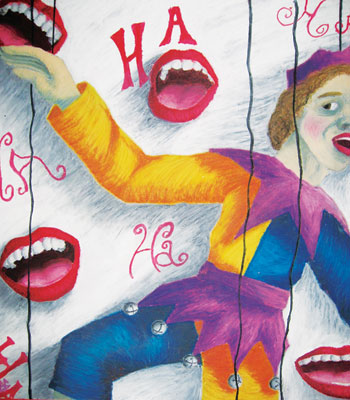All Nonfiction
- Bullying
- Books
- Academic
- Author Interviews
- Celebrity interviews
- College Articles
- College Essays
- Educator of the Year
- Heroes
- Interviews
- Memoir
- Personal Experience
- Sports
- Travel & Culture
All Opinions
- Bullying
- Current Events / Politics
- Discrimination
- Drugs / Alcohol / Smoking
- Entertainment / Celebrities
- Environment
- Love / Relationships
- Movies / Music / TV
- Pop Culture / Trends
- School / College
- Social Issues / Civics
- Spirituality / Religion
- Sports / Hobbies
All Hot Topics
- Bullying
- Community Service
- Environment
- Health
- Letters to the Editor
- Pride & Prejudice
- What Matters
- Back
Summer Guide
- Program Links
- Program Reviews
- Back
College Guide
- College Links
- College Reviews
- College Essays
- College Articles
- Back
New Pair of Eyes MAG
Let me tell you, transforming into a mouse in front of my camp was flat out difficult. I was challenged trying to maintain a British accent, acting like an eight-year-old when I was tall enough to be 18, and last but not least, morphing into a mouse without making it look like the ultimate downfall of my acting career. And yet, that wasn't even the hardest part. Physically becoming that mouse in Roald Dahl's “The Witches” was a challenge, but psychologically altering myself was twice as difficult.
Plenty of people see acting as a window to fame. Center stage, spotlight beaming down, all eyes focused on your impenetrable self. But as much as I love the rush of being on stage, that's not why I'm an actor. There's something about picking up a script, looking at a character someone from somewhere put together, and becoming that character. Taking words, simple letters conjoined with one another, and blending them into myself to create an entirely new human being who exists in a two-hour fictional world.
It's glorious.
I don't see a character as just another opportunity to stand on stage and “act.” Playing a character is dissecting each and every stage direction, phrase, sentence, giggle, laugh, and shout. Playing a character is taking your identity, principles, morality of what is right and wrong, and synthesizing them with what your character believes, and having the ability to look at the world through their eyes – a completely new perspective. It's remarkable to see the world through a new pair of eyes.
When I assumed the form of Stanley Kowalski in “A Streetcar Named Desire,” I learned that he was a brutish, aggressive, supercilious chauvinist. Of course I wasn't going to turn down the role because we were two completely different people; I accepted the challenge. Stanley Kowalski, as fictional as he may be, is still a human being. He's had experiences – trials and tribulations – that have transformed him, causing him to become the belligerent man we know. Who am I to judge him and call him a “bad” person? Instead, I saw the world through his eyes – his perspective. It became so clear why I smashed a glistening white plate on the ground, why I despised my wife's sister with every fiber of my being, and why I desperately tried to take back the woman I loved. I had become Stanley.
Acting is seeing the world through the eyes of others. People we understand and empathize with. People we may despise. People we may never know. Acting is not about how large the audience is; it's about how I can view the world as another person, and try to understand their actions.
Being inside the head of a mouse is something most people will never experience, and I have to say, I'm incredibly grateful for that opportunity. Because now I can tell you exactly why people put cheese on mouse traps.

Similar Articles
JOIN THE DISCUSSION
This article has 0 comments.
